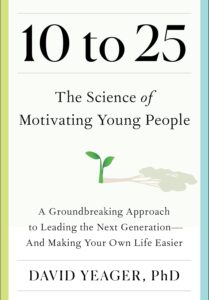Podcast: Play in new window | Download
 One of the most common questions on the minds of workplace managers today is, “How can I most successfully manage the new generation of people entering the workforce?” This is a crucial question, as not only are the dynamics of the workplace rapidly changing – the generation of workers aged 18 to 25 really does have unique needs needing our support.
One of the most common questions on the minds of workplace managers today is, “How can I most successfully manage the new generation of people entering the workforce?” This is a crucial question, as not only are the dynamics of the workplace rapidly changing – the generation of workers aged 18 to 25 really does have unique needs needing our support.
Dr. David Yeager, a renowned developmental psychologist and the author of the groundbreaking bestseller, “10 To 25: The Science of Motivating Young People” fundamentally breaks away from our traditional beliefs on how to motivate young people.
In his book, he draws on cutting-edge research which shows that around age ten, puberty spurs the brain to crave socially rewarding experiences, such as pride, admiration, and respect – and to become highly averse to social pain, such as humiliation or shame. And because this hyper-sensitivity to status and respect continues all the way into the mid-twenties, managers can leverage these insights to create a work environment that not only meets the needs of their young employees but also harnesses their full potential. 
Dr. Yeager introduces what’s called a “mentor mindset – a leadership style that’s finely attuned to the unique needs of young people for status and respect.
His practices include validating young people’s perspectives rather than dismissing them, asking them questions instead of telling them what to do, being transparent about our beliefs and goals rather than assuming they will accurately guess our thoughts, and holding them accountable to high standards instead of coddling them.
To be clear, this isn’t done for the purpose of making young people feel good. It’s about tapping into the basic neurobiological systems that drive their motivation and behavior – and which influences them to perform at very high levels.
One of the biggest misconceptions about mentoring is that it takes up too much time. Dr. Yeager dispels this myth by showing that those who use the mentor mindset actually end up with more time. Through back-and-forth conversations, young people feel empowered, and managers can transfer more responsibility to them. This not only frees up the manager’s time but also fosters a sense of ownership and accountability among young employees.
It’s easy to be jaded about having to support yet another new generation’s unique needs – but if our goal is to have a workplace where young people aren’t just clocking in and out, but are genuinely engaged, enthusiastic, and ready to contribute – we’re rather wise to match those needs.
It also just so happens that mastering these skills will make you a better manager to employees of all generations.




